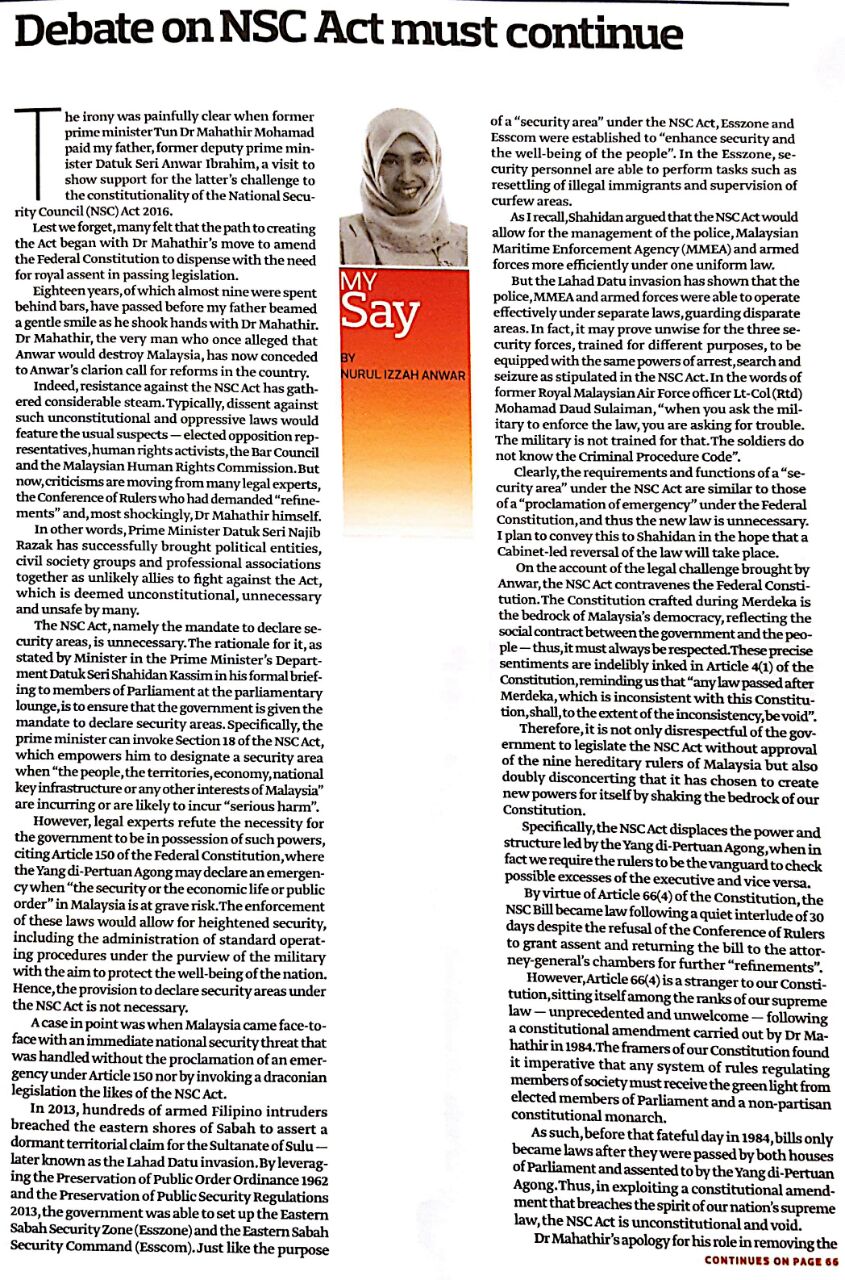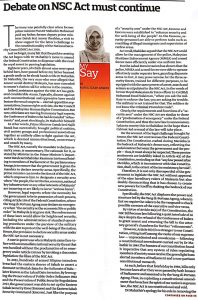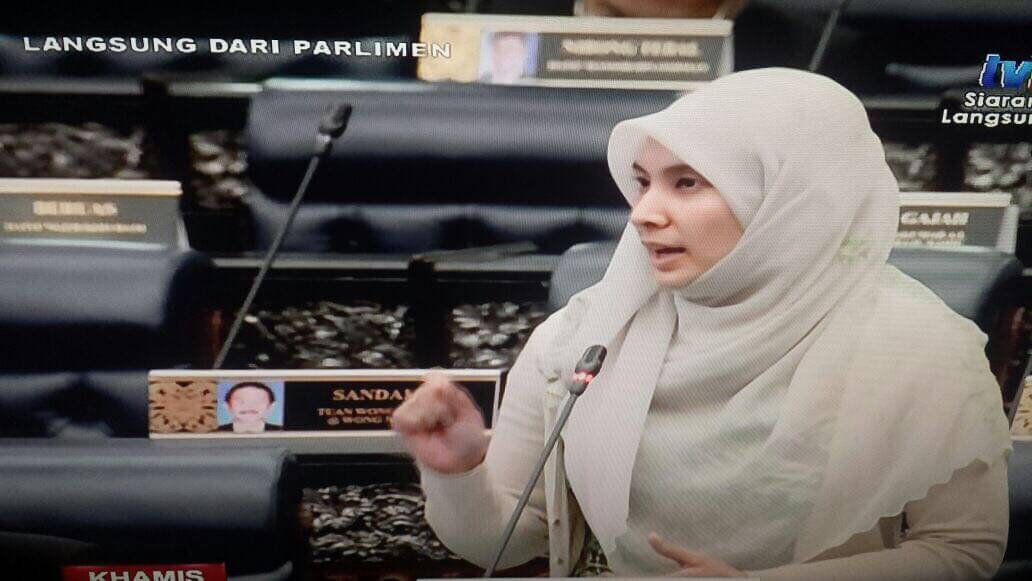The irony was painfully felt when Tun Mahathir Mohamad paid my father, Datuk Seri Anwar Ibrahim a visit in a show of support for the latter’s challenge on the constitutionality of the National Security Act 2016. Lest we forget, the path to the creation of the National Security Council Act 2016 began with Tun Mahathir’s move to lead the constitutional amendment which nullified the need for royal assent in passing legislations.
Eighteen years, of which almost nine were spent behind bars, had passed before my father, Datuk Seri Anwar Ibrahim beamed a gentle smile as he took Tun Mahathir Mohamad’s hands in a handshake. Tun Mahathir, the very man who once alleged that Datuk Seri Anwar Ibrahim would destroy Malaysia, has now conceded to Anwar’s clarion call for reforms in the country.
Indeed, since its inception, resistance against the NSC act has gathered considerable steam. Typically, dissent against such an unconstitutional and oppressive act would feature the usual suspects – elected opposition representatives, human rights activists, the Bar Council, and the Malaysian Human Rights Commission. Instead, criticisms were also fielded by legal experts belonging to the Air Force, the Conference of Rulers who demanded “refinements”, and most shockingly, former Asian strongman and occasionally labelled dictator – Tun Mahathir Mohamad.
In other words, Prime Minister Datuk Seri Najib Razak has successfully brought political entities, civil society groups and professional associations together as unlikely allies to fight against the act, deemed unconstitutional, unnecessary and unsafe.
The National Security Act 2016 – namely its mandate to declare security areas – is unnecessary. The rationale for the NSC Act, as stipulated by Datuk Seri Shahidan Kassim in his formal briefing to Members of Parliament at the Parliamentary lounge was to ensure the government is provided with a mandate to declare security areas. Specifically, the Prime Minister can invoke Section 18 of the NSC, which empowers him to designate a security area when “the people, the territories, economy, national key infrastructure or any other interest of Malaysia” is incurring or is likely to incur “serious harm”.
However, legal experts refute the necessity for the government to be in possession of such powers, citing Article 150 of Malaysia’s Federal Constitution. Under Article 150, the Yang di-Pertuan Agong may declare an emergency when “the security, or the economic life, or public order” in Malaysia is at grave risk. The enforcement of either of these laws would allow for heightened security, including the administration of standard operating procedures under the purview of the military, with the aim to protect the well-being of the nation. Hence, the provision to declare security areas under the NSC Act remains completely unnecessary.
A case in point was when Malaysia came face-to-face with an immediate national security threat that was handled without the proclamation of an emergency under Article 150, nor by invoking a draconian legislation of the likes of the NSC Act.
In 2013, hundreds of armed Filipino rebels breached the eastern shores of Sabah to assert a dormant territorial claim for the Sultanate of Sulu, becoming what is now known as the Lahad Datu invasion. By leveraging the Preservation of Public Order Ordinance 1962 and the Preservation of Public Security Regulations 2013, the government was able to set up the Eastern Sabah Security Zone (ESSZONE) and the Eastern Sabah Security Command (ESSCOM). Echoing the purpose of a “security area” under the NSC Act, the ESSZONE and the ESSCOM were established to “enhance security and well-being of the people”.[1] In the ESSZONE, security personnel are able to perform tasks such as resettle illegal immigrants and supervise curfew zones.[2][3]
As I recall, Datuk Seri Shahidan Kassim argued that the NSC Act would allow for the management of the police, maritime enforcement agency and armed forces more efficiently under one uniform law.
But the Lahad Datu invasion has shown that the police, maritime enforcement agency and armed forces were able to operate effectively under separate laws, guarding disparate areas governing national security. In fact, it may prove unwise for the three security forces, trained for different purposes, to be equipped with the same powers of arrest, search and seizure as stipulated in the NSC Act. In the words of former Royal Military Air Force officer Lt-Col (Rtd) Mohamad Daud Sulaiman, “When you ask the military to enforce the law, you ask for trouble. The military is not trained for that. They do not know the Criminal Procedure Code (CPC).”
Clearly, the requirements and functions of a “security area” under the NSC Act share similarities with that of an “proclamation of emergency” under the Federal Constitution and is thus unnecessary. I plan to convey this to Minister Datuk Seri Shahidan Kassim in the hopes that a cabinet-led reversal of laws would take place.
Secondly, on account of the current legal challenge brought by Datuk Seri Anwar, the NSC act contravenes our Federal Constitution. The Merdeka constitution is the bedrock of Malaysia’s democracy, reflecting the social contract between government and the people — and thus, must always be respected. These precise sentiments are indelibly inked in Article 4(1) of the Constitution, reminding us that “any law passed after Merdeka Day which is inconsistent with this Constitution shall, to the extent of the inconsistency, be void.”
As such, it is not just disrespectful of the government to legislate the NSC Act without approval of the nine hereditary rulers of Malaysia, it is doubly disconcerting that they have chosen to create new powers for themselves by upsetting the bedrock of our Constitution.
Specifically, the NSC act displaces displaces the power and structure led by the Yang di-Pertuan Agong into the hands of the Prime Minister. When in fact we require the Rulers as vanguards over possible excesses of the Executive and vice versa.
By virtue of Article 66 (4) of our Constitution, the NSC bill was allowed to lapse into a full-fledged law following a quiet interlude of 30 days despite refusal from the Conference of Rulers to grant assent, returning the bill to the Attorney General’s chambers for further ‘refinements’.
However, Article 66 (4) is a stranger to our constitution, sitting itself among the ranks of our supreme law – unprecedented, unwelcome – following a constitutional amendment by Tun Mahathir in 1984. The framers of our Constitution found it imperative that any system of rules regulating members of society must receive the green light from elected members of parliament, and also, a non-partisan constitutional monarch.
As such, before that fateful day in 1984, bills only become laws when passed by both houses of Parliament and assented to by the Yang di-Pertuan Agong. Thus, in exploiting a constitutional amendment that breaches the spirit of our nation’s supreme law, the NSC is unconstitutional and void.
Tun Mahathir’s apology for his role in removing the need for royal assent in legislation is especially pertinent. The 1984 constitutional amendment has taught us a lesson that whittling away the powers of the Yang di-Pertuan Agong is a slippery slope that empowers the Executive at the expense of other branches of government.
Today, the realisation that royal assent remains relevant has led Tun Mahathir to offer legal aid to support Datuk Seri Anwar’s effort in challenging the constitutionality of the NSC bill.
Thirdly, experts concur that as an actual legislation, the National Security Act 2016 is haphazard and poorly drafted.
Tracing its beginnings to 2011, the act is an unfortunate by-product of Prime Minister Najib’s revocation of the 1966, 1969, 1977 proclamations of emergency – one that was done without adequate preparation. Admittedly, Prime Minister Najib’s decision to revoke these states of emergency, nearly four decades old since their inception, was appropriate. These emergency proclamations were obsolete and should have been revoked years before.
However, these proclamations of emergency had provided the necessary legitimacy to many laws and agencies – such as the untrained paramilitary force RELA (People’s Volunteer Corps) and the neighbourhood watch, Rukun Tetangga. Thus, the removal of these three proclamations require a coherent mechanism in replacing the necessary laws or agencies before the end of the six-month period – following which all would become null and void.
As such, in the April 2011 parliamentary sitting, I submitted a private member’s bill calling for the Revocation of Emergency Declarations, drawing emphasis to a particular clause which sought to empower the relevant ministries to replace crucial legislations – once under the purview of emergency laws.
Unfortunately, my emergency revocation bill was rejected by the Speaker of Parliament. Yet, just five months later, I was pleasantly surprised when Prime Minister Najib also placed a motion to repeal the three emergency declarations. But without detailed provisions to equip the relevant ministries for transition into an era free of emergency laws, many crucial and necessary laws would become defunct.
Thus, as the six-month transition period lapsed, the reckless revocation of emergencies led to a set of new laws – forced through parliament without substantial deliberation, debate, nor engagement. Specifically, the Prevention of Terrorism Act 2015 and the Security Offences (Special Measures) Act 2012 were both heavily criticised for human rights violations. These laws have provisions that hold suspects back from access to legal counsel, enables detention without trial for up to two years, and restricts judicial reviews. The blatant disregard that the NSC act has for fundamental human liberties is no different, allowing warrantless arrests, threatening peaceful dissent and disrespecting a person’s basic rights to a fair trial.
Unnecessary, unconstitutional and unsafe, the NSC Act is the landmark of an insidious new normal in Malaysia. For all rights and freedoms that the NSC act encroaches upon, we must remember that it is but the tip of the iceberg of Malaysia’s oppressive laws — disguised conveniently as the antidote to national security threats, yet in actuality an unmerciful hammer to suppress political dissent — and must be restrained.
The handshake between former political nemeses marks the start of political engagement. As a parliamentarian, I have been entrusted the mandate to engage with my counterparts in fruitful debate and to lay the foundation for sound laws for a better society. Thus, moving forward, the Parliament must support the setting up of a Parliamentary Select Committee on national security and defence. Having representatives that span across the ideological continuum to deliberate the nature of Malaysia’s National Security Council would mitigate the ascendancy of legal creations that only emboldens government by disenfranchising society.
For every single reason mentioned, the National Security Council Act 2016 is the real threat — not only to National Security but also to our Constitutional Democracy, and by extension, to all Malaysians.






